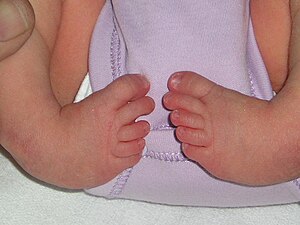畸形足
畸形足是一种先天性障碍,是指婴儿出生时一只脚或双脚不正常的自然弯曲。其中男婴患上畸形足的概率比女婴更大。出现畸形足的概率为四百分之一。 [3][1][4][1][1][5][1]如果不及时治疗,畸形足会造成患者行动异常、疼痛以及行走困难[2][6]。目前尚未厘清造成畸形足的确切原因。 [1][2]据信遗传和环境因素都有可能导致婴儿出现畸形足。 [1][2]
| 畸形足 | |
|---|---|
 | |
| 风险因素 | 遗传[1] |
| 诊断方法 | 理学检查[1][2] |
| 分类和外部资源 | |
| 医学专科 | 骨科 |
| ICD-11 | LB98.00 |
| ICD-9-CM | 754.51 |
| OMIM | 119800、119800 |
| DiseasesDB | 29395 |
| MedlinePlus | 001228 |
| eMedicine | 407294、1237077 |
参考文献
编辑- ^ 1.0 1.1 1.2 1.3 1.4 1.5 1.6 1.7 Gibbons, PJ; Gray, K. Update on clubfoot.. Journal of Paediatrics and Child Health. September 2013, 49 (9): E434–7. PMID 23586398. S2CID 6185031. doi:10.1111/jpc.12167.
- ^ 2.0 2.1 2.2 2.3 Dobbs, Matthew B.; Gurnett, Christina A. Update on clubfoot: etiology and treatment. Clinical Orthopaedics and Related Research. 18 February 2009, 467 (5): 1146–1153. ISSN 1528-1132. PMC 2664438 . PMID 19224303. doi:10.1007/s11999-009-0734-9.
- ^ 书名: 《哈佛家庭医学全书 儿童健康手册》 作者: (美)安东尼·L.科马罗夫著 当前第:143页
- ^ Talipes equinovarus. Genetic and Rare Diseases Information Center (GARD). 2017 [15 October 2017]. (原始内容存档于15 October 2017) (英语).
- ^ Smythe, Tracey; Kuper, Hannah; Macleod, David; Foster, Allen; Lavy, Christopher. Birth prevalence of congenital talipes equinovarus in low- and middle-income countries: a systematic review and meta-analysis. Tropical Medicine & International Health. March 2017, 22 (3): 269–285 [2022-07-17]. ISSN 1365-3156. PMID 28000394. doi:10.1111/tmi.12833 . (原始内容存档于2021-08-28).
- ^ O'Shea, Ryan M.; Sabatini, Coleen S. What is new in idiopathic clubfoot?. Current Reviews in Musculoskeletal Medicine. December 2016, 9 (4): 470–477. ISSN 1935-973X. PMC 5127955 . PMID 27696325. doi:10.1007/s12178-016-9375-2.